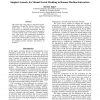49 search results - page 4 / 10 » Basics of Game Theory for Bioinformatics |
FSTTCS
2008
Springer
13 years 8 months ago
2008
Springer
Abstract. We study the decision theory of a maximally risk-averse investor — one whose objective, in the face of stochastic uncertainties, is to minimize the probability of ever ...
IPL
2006
13 years 7 months ago
2006
We present a Coq-formalised proof that all non-cooperative, sequential games have a Nash equilibrium point. Our proof methodology follows the style advocated by LCFstyle theorem p...
KI
2008
Springer
13 years 5 months ago
2008
Springer
The research aim of this paper is to represent everydaylife patterns of thought like "Because I know, what you think I think ..." by a process on a machine, which is inv...
ROBOCUP
2004
Springer
14 years 22 days ago
2004
Springer
The paper discusses a top-down approach to model soccer knowledge, as it can be found in soccer theory books. The goal is to model soccer strategies and tactics in a way that they ...
CSCLP
2008
Springer
13 years 9 months ago
2008
Springer
Abstract. Over the last decade, first-order constraints have been efficiently used in the artificial intelligence world to model many kinds of complex problems such as: scheduling,...

